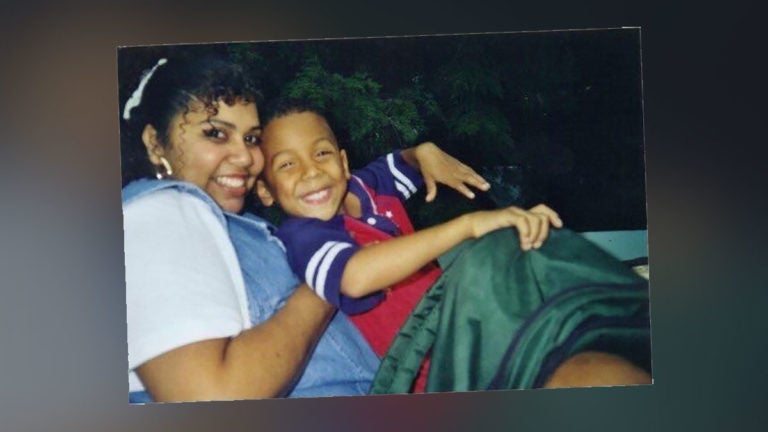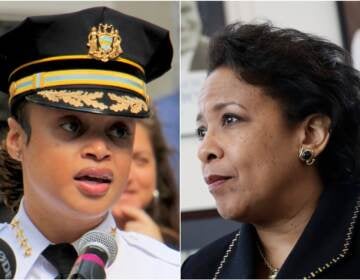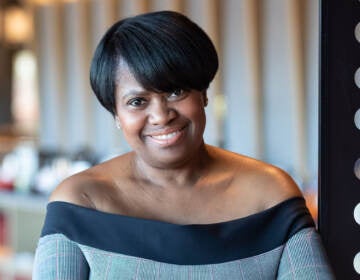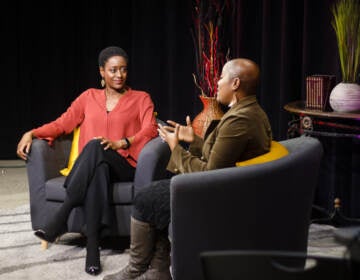My mother is a feminist. She raised me to be one, too
For Women’s History Month, Roberto Valdes honors his mother, Kelly Beaz, who taught him the values of feminism.

Roberto Valdes, at age 7, with his mother Kelly Beaz at Hershey Park. (Courtesy of Roberto Valdes)
My mother, Kelly Baez, was the person that provided me guidance during adolescence. My father was in the home, too. But his struggles with substance abuse made it nearly impossible for him to offer good advice.
Growing up, I don’t recall my mother self-identifying as a feminist or even using language associated with feminism.
Nonetheless, she taught me to believe in a woman’s right to participate equally in democracy. She also emphasized to my brother and I that women don’t exist merely for men’s pleasure. My mother would often point to my maternal grandmother as another example of strong women in our family.
Both my mother and grandmother faced a lot of harsh criticism from folks who shamed them, in our family and outside of it, for leaving their husbands and raising their kids as single mothers, but they persevered.
When I moved to Central Pennsylvania for college, I started developing a vocabulary for the values I was taught. I soon realized that my mother, an outspoken Puerto Rican woman, is a feminist. And so am I.
Over the years, my mother and I have talked about everything from rape culture and abortion rights, to Hillary Clinton, Beyoncé and the need for society to stop policing women’s sexuality. But when we talked about my activism on campus, it was clear how her teachings had instilled in me a sense of responsibility and urgency to address women’s issues.

At Lebanon Valley College, I was involved in campus-wide discussions about rape culture. Participants in these talks recommended a more restrictive dress code and enforcing the drug and alcohol policy, neither of which addressed the underlying problem: men’s behaviors towards women. I spoke up, making it clear that these solutions equated to victim-blaming.
I left those discussions with the opinion that violence against women is due to misogyny, a contempt for, or an ingrained prejudice against women. It wasn’t until my undergraduate years that I learned just how institutionalized misogyny is.
Despite the many parents like my mother who teach their young boys to respect and honor women, misogyny remains pervasive. I see it every day in the courtroom.
I’m in my third year of practicing law in Philadelphia. My peers often celebrate my assertiveness as a strength. It appears my gender doesn’t negatively impact my ability to perform at work.
However, I can think of countless women – such as Jean Carn-Wolfe, a Deputy City Solicitor for the City of Philadelphia; Lanique Roberts, a local family law attorney; Jennifer Santiago, Lauren Perchinski, Bennette Harrison, and Hermionne Cadet, an Assistant District Attorney – who bring a level of intellectual rigor to their practice of the law, and yet their assertiveness is viewed as off-putting. I’ve personally heard opposing counsel refer to the women I’ve mentioned as bitches. Prior to working for the city, I learned from some of them about their experiences with confronting pay inequities. Advocating for themselves based on their merit was not received well.
According to my colleagues, these sexist characterizations do take an emotional toll, such as feeling unmotivated to argue cases. The women in my life who have battled such sexism are resilient and will continue to fight for parity in the workplace. They are stronger than the archaic views of misogyny that seek to oppress them.

Although men as a whole are not responsible for the creation and perpetuation of sexism, we can all step up to be an ally. This will require all men to listen to the voices of women whose daily lives are negatively impacted by sexism. And in addition to just listening, men should consider mentoring talented women who they know have been overlooked at the office. When a new project arises, recommend women to take the lead.
This month celebrates women’s history. But it’s not enough for society to simply celebrate women’s progress. It’s not even enough to be pro-women. We must be anti-sexist. We must center women – including trans women – and protect them.
A while ago, I came across a quote from Kelley Temple, National Union of Students UK Women’s Officer, that fits this moment: “Men who want to be feminists do not need to be given a space in feminism. They need to take the space they have in society and make it feminist.”
I believe feminism is good for the masses, because that’s what Kelly Baez, my mother, taught me.
—
Roberto Valdes is an openly gay, accomplished lawyer living in Philadelphia.
Becoming a storyteller for WHYY, your local public media station, is easier than you might think. Text STORYTELLER to 267.494.9949 to learn more.
WHYY is your source for fact-based, in-depth journalism and information. As a nonprofit organization, we rely on financial support from readers like you. Please give today.




